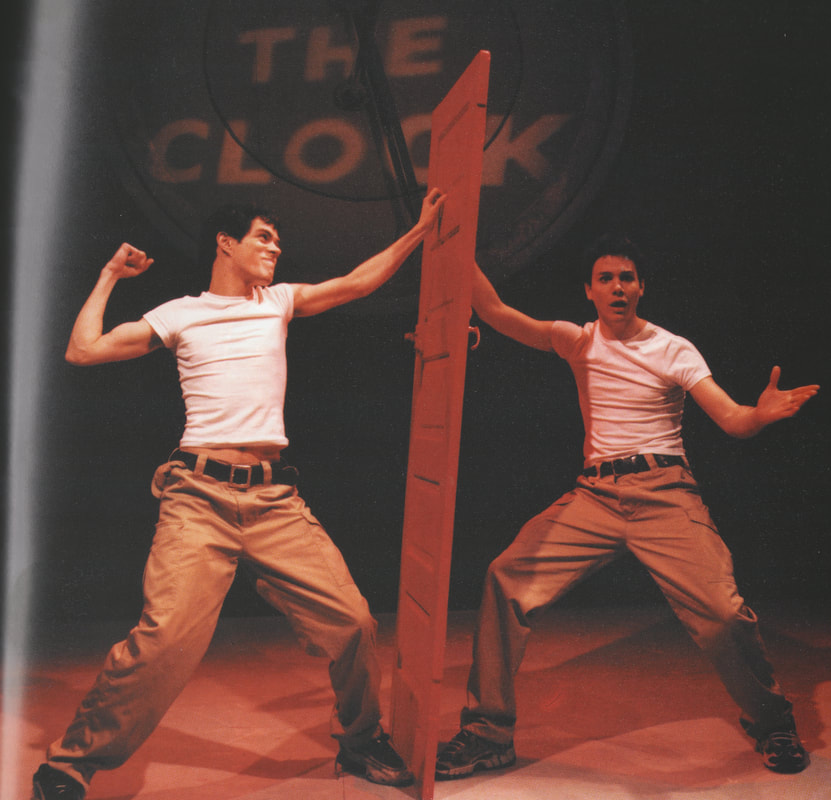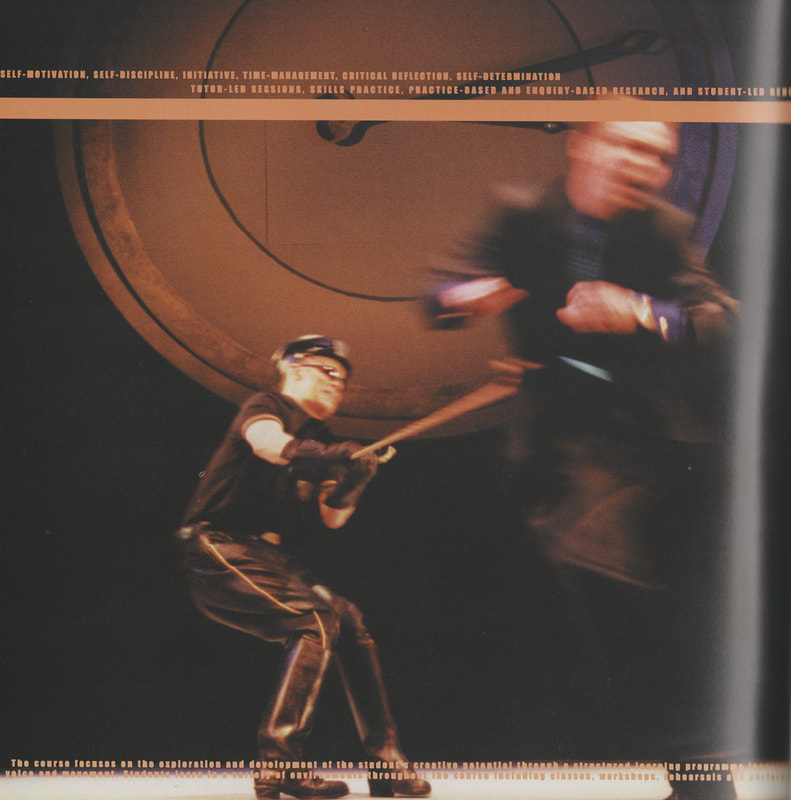Gotta love Shakespeare - The Comedy of Errors (a ... comedy) starts with a man being condemned to death. (Egeon, a merchant of Syracuse, is condemned to death in Ephesus for violating the ban against travel between the two rival cities). My dark imagination was engaged.
Set-up = stage set
The great joy of directing a final year production at a Drama School means the Design Students can support the production. I decided on a bold premise. The whole play takes place on a television sound stage. Before the play proper begins, people with headsets and clipboards roam the set - at this moment just a large empty grey platform with a gentle rake.
Most of the play was played for comedy - there was, however a Dark Clown predicament in the opening scene, which I describe here.
Pressurised Predicament - Beat the Clock
A giant clock face (whose hands turned throughout the play) is suspended at the back. At certain moments, the names of the various shows* is projected onto it e.g. (towards the end): 'The Abbess knows Best'.
A sofa is brought on and we hear a classic undulating tones of an American chat show Voice Over: 'Ladies and Gentlemen, citizens of Ephesus, welcome to 'Beat the Clock', with your host, that provocative Prince of electrifying entertainment, Duke Solinus!
Act 1 Scene 1 - bit of Implication
Canned applause and the production staff gee up the live audience applause too, using cue cards.
Duke Solinus: Hello Ephesians! Welcome to the show where we find out: will someone be Frying To(morrow ) Night? (Badoom tish ending in a short blare of electrical fizz) But first, do you want to see the chair?
Audience are encouraged by cue cards to chant 'Show. Us. The chair!' (supported by canned chanting)
A chair, somewhat reminiscent of an electric chair, is brought on. (Scary tick tick buzz sting and the chanting ends on a button)
Duke Solinus: So, Lance - who do we have in the chair tonight?
Voice Over: Well, Duke, today's illegal immigrant comes all the way from Syracuse. He's a small businessman, separated from his family. Let's give a warm welcome to our somewhat melancholy merchant from ... Syracuse!
Audience are encouraged by cue cards to boo at the mention of their rival town (supported by canned booing), as Egeon - in an orange prison uniform, handcuffed and hooded is frogmarched on by two operatives wearing attire reminiscent of executioners and differently masked.
Egeon's hood is whipped off and the poor man flinches and blinks, dazzled by the light. A studio crew operative has crawled on and, kneeling, affixes a lapel mic to Egeon, which unexpected action (and the fact that there are wires involved) startles and frightens the captive Egeon.
Duke Solinus: Speak, Syracusian!
.... 'say in brief the cause
Why thou departed'st from thy native home
And for what cause thou camest to Ephesus.'
High Stakes and Enforced Performance
Egeon begins to tell his tale (the pressure is on because Egeon's tale is, not in the least 'brief'). Plus not only is the poor man being forced to tell his tale, he finds himself in the ghastly position of being made complicit in the prostitution of his personal pain. No sooner has he begun, when smiling hired actors dressed as mimes come on with props to enact the events. Imagine the humiliation of your heart-rending tale being presented as prime time entertainment. Imagine recounting how sailors stranded you, your wife and your twin babies to a 'sinking-ripe' ship while smiling facilitators waft a rising cloth (to represent the sea) up to your neck and bind plastic baby dolls (representing your missing children and their servants) together. Imagine hearing audience laughter while this is happening.
When Egeon falters with stress, disorientation and emotion, the Duke says:
'Nay, forward, old man; do not break off so;
For we may pity, though not pardon thee.'
It's like those unscrupulous reporters who prod people's emotions: 'And how did it feel when (the disastrous thing) happened?'. Here it is even worse: 'You're still going to die, but let us have an emotional experience from your predicament'.
The cost
Egeon is forced to continue his account and he does, lamenting that
'by misfortunes was my life prolonged
To tell sad stories of my own mishaps.'
Whereupon, the Duke obliges him to recount more: 'dilate at full
What hath befall'n of them and thee till now.'
Once Egeon has been wrung out, Solinus makes (in this production) a show of cheesy magnanimity by posing the challenge:
'I'll limit thee this day
To seek thy life by beneficial help:
Try all the friends thou hast in Ephesus;
Beg thou, or borrow, to make up the sum,
And live; if no, then thou art doom'd to die.'
As in the plot of the film Run Lola Run, Egeon must raise a huge sum (in this case, a thousand marks) and he only has 24 hours to do so (... or 'feel the burn').
Duke Solinus then points in a showman-like manner at the large clock which sounds a few loud and momentous ticks, followed by the electrical buzz sting.
Egeon is stripped of his prison uniform and begins his faltering steps off stage while studio crew rush onto the set with cue cards encouraging the audience to chant 'Beat the Clock!' (supported by canned chanting).
On to Act 1, Scene 2 ...
* Antipholus of Ephesus's house was played like Friends, with Adriana and Luciana discussing Adriana's problems over a tub of Hagen Daas. At the moments there were costumes and props for other shows passing through e.g. a war programme. Plus Teleevangelism (Pinch) and adverts for Angelo's jewellery business. The courtesan was portrayed as a successful Dominatrix. Voice Over: "In just a moment it's double your pleasure with the gang from 'Ephesus Bay' - it's the one where Adriana's miffed at Antipholus's tardiness, Luciana is obsessed by hot new boy in town and as usual, Dromio gets the wrong end of the stick ... Laugh? You will, but first a glimpse of late night low life - it seems local businessmen are seeking a little correction in 'Ephesus Vice'. Stay tuned!"


 RSS Feed
RSS Feed
